
Author and Page information
- This page: https://www.globalissues.org/article/801/cop18-doha-climate-conference.
- To print all information (e.g. expanded side notes, shows alternative links), use the print version:
On this page:
Introduction
 November 26 – December 7, 2012, Doha, Qatar is the venue for the 18th annual United Nations Climate Change Conference, also known as the 18th Conference of the Parties — or COP 18.
November 26 – December 7, 2012, Doha, Qatar is the venue for the 18th annual United Nations Climate Change Conference, also known as the 18th Conference of the Parties — or COP 18.
Predictably and sadly, the same issues complained about at previous annual meetings for the past decade continue to recycle themselves:
- Lack of quality (if any) media coverage
- West stalling on doing anything
- Lack of funding
- Disagreement on how to address it
- etc.
As the past two decades have shown trying to get global agreement on tackling climate change seems to be futile. By comparison, more focused and limited interest of elites, however, are easier to push through, such as wars based on geopolitical threats (real and imaginary), or economic crises (where banks and other elites most responsible for the crises are bailed out by ordinary citizens).
Furthermore, as the West has generally shown in the past decade or more (even when their economies were doing good) paying now for something that seems to be a problem in the future is hard to accept. It is easier, therefore, to stall and keep blaming China, India and other emerging nations despite the historical inequality of those emissions. But ignoring that makes it easier to hope these emerging nations will pick up the burden of addressing emissions rises.
A summary from the Malaysian-based development organization, Third World Network, notes that once again there are disagreements on how to proceed with basic aspects of these climate discussions such as how to agree on the next round of emission reductions:
Developing countries want the Doha talks to produce increased ambition in emission reductions for the second commitment period (CP2) while developed countries seem set to maintain their currently weak targets, with uncertainty over the future review of those targets.
Developing countries are also insisting that the [new reduction targets] be established in a ratifiable legally binding amendment of [the Kyoto Protocol], that contains the quantified emission limitation or reduction objectives (QELROs) of each developed country Party.
Many developing countries also want a legal provision for provisional application of the QELROs from 1 January 2013 that developed countries do not support.
According to several developing country delegates, without provisional application on a legal basis, the reduction commitments would be rendered voluntary.
Generally speaking, media coverage of climate change issues and these conferences has been a mixed bag over the past decade. More recent years has seen increased interest and coverage (though many important issues are glossed over in mainstream media sound-byte style reporting).
When I wrote a similar page about a year ago regarding the previous conference, COP 17, I noted that (as with many previous conferences), I described mainstream media coverage as pathetic
and almost non-existent until the very last few moments.
I added that in reality money speaks and so short term and elite/establishment views tend to prevail, which is why governments can so quickly get the 99%
to bail out the banks and the top 1% with many trillions of dollars, while finding billions for fighting even more devastating climate change has taken almost 2 decades so far without any convincing results.
It seems like that will be the case again this year. As of writing, it is half way through the conference and scanning mainstream media headlines in the UK, I see no coverage of the conference (at least not as major news headlines). It is very possible I have missed it, but one would hope that a conference of such importance would not require much detailed look at mainstream media news headlines to find coverage of it.
Indeed, this comes at a time when the British press is facing threats of regulation following scandals about journalist practices by some tabloid papers. Ironically, the British press now fears regulation will hinder their free speech (a legitimate worry). But what free speech are they fighting for? For more narrow coverage and tabloid headlines?
It is worth quoting again an article from Media Lens about a year ago on the poor media quality coverage in recent years.
Media interest in the subject has crashed. Dr. Robert J. Brulle of Drexel University describes a
collapse of any significant coverage of climate change in the [US] media. We know that 2010 was a record low year, and 2011 will probably look much the same. If the media doesn’t draw attention to the issue, public opinion will decline.…
Equally disturbing is the variation in media performance across the globe. A wide-ranging Reuters study on the prevalence of climate skepticism in the world’s media — Poles Apart — The international reporting of climate skepticism – focused on newspapers in Brazil, China, France, India, the UK and the USA. The periods studied were February to April 2007 and mid-November 2009 to mid-February 2010 (a period that included the UN climate change summit in Copenhagen and
Climategate). Remarkably, the study concluded that climate skepticism ispredominantly an Anglo-Saxon phenomenon, found most frequently in US and British newspapers.…
And so we find that Britain and the US — the two countries responding most aggressively to alleged
threatsto human security in countries like Afghanistan, Iraq and Libya — are also the two countries least interested in responding to the very real threat of climate change.
Climate Crisis – The Collapse In Corporate Media Coverage
, Media Lens, December 1, 2011
It would be worth reading the media section of the previous conference to see more about media coverage.
President Obama was recently re-elected as President of the United States. It is not clear how much impact the devastating impact of Hurricane Sandy had on climate change policies (and it may also be too early to tell), but many certainly felt that in the days leading up to the election it may have been a factor. Perhaps, importantly, for the first time, climate denial may become a political liability in the US, and it remains to be seen how much the Republicans will hamper Obama’s climate policies.
The more extreme news organization in the US, Fox News, was found to to have 93% of their climate reporting as misleading. And this channel is a prime channel for Republican leaning viewers. This is also despite promises by Murdoch many years ago to improve climate change reporting. But it is not just Fox News, although not media outlets themselves many other influential corporations have been actively supporting misrepresentation of the science around climate change, undermining the US public’s understanding of scientific consensus around climate change.
Numerous recent reports are finding that climate scientists, far from being alarmist and scaremongering, have somewhat underestimated the speed at which climate change impacts such as extreme weather and rising sea levels will happen and that many conditions match their upper estimates rather than any median or better-scenario estimates.
For example, the conference comes at the end of a year that saw record Arctic sea ice melting, multiple global weather and climate extremes, and high temperatures.
For years countries have worried that funding for adaptation and mitigation is not affordable (rich and poor nations alike) and yet, as time goes on, adaptation and mitigation costs will be even higher.
Even the World Bank has chimed in noting that
Coal, oil and gas companies and their backers in the financial and investment industry must stop putting billions of dollars into finding and extracting new sources of fossil fuels. If they don’t shift their investments, temperatures will soar four to 10 degrees C higher, devastating many parts of the world, the World Bank said Monday.
Despite years of this, things do not seem to change much. Perhaps it is because there isn’t an emotional attachment to the issue; it is distant, vague, complex. However, as David Robert notes,
Climate change is not only the economic and ecological crisis of our time, it’s also a moral crisis. What we are doing to our descendants is a moral crime. Finding ways to help people get that, feel it in their guts the way they would if someone threatened their own families, is a precondition for serious, sustained action.
More information
As the conference is still underway as this page is written, more information will be added here after the event is over.
For more about the issues from other organizations, here are some starting points:
News stories from IPS
Below is a list of stories from Inter Press Service related to the Durban climate conference and its aftermath.
-
Adapting to climate change ‘happening worldwide’, essential
– UN News

The impacts of climate change are already “very visible” and “happening worldwide”, the head of the UN weather agency told the start of the 55th Session of the UN’s Intergovernmental Panel on Climate Change (IPCC) which convened on Monday.
-
Climate Change: Adapt for the Future, Not the Past
– Inter Press Service

SYDNEY and KUALA LUMPUR, Dec 07 (IPS) – Funding for developing countries to address global warming is grossly inadequate. Very little finance is for adaptation to climate change, the urgent need of countries most adversely affected. Also, adaptation needs to be forward-looking rather than only addressing accumulated problems.
-
Climate Change with 8 Billion Humans
– Inter Press Service
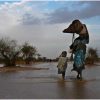
PORTLAND, USA, Nov 23 (IPS) – With world population approaching 8 billion humans, the demographic growth of nations is unfortunately largely ignored by governments whenever climate change is considered.
-
Violence, insecurity and climate change drive 84 million people from their homes
– UN News

As more people flee violence, insecurity and the effects of climate change, the number forcibly displaced now exceeds 84 million globally, according to new data released on Thursday by the UN refugee agency, UNHCR.
-
Climate change increasing threats in southwest Pacific: WMO report
– UN News

From rising sea temperatures, to deadly and devastating storms and floods, climate change is increasing threats in the southwest Pacific, the World Meteorological Organization (WMO) said in a report published on Wednesday.
-
COP26: Avoiding Carbon Tunnel Vision: Action on Climate Change Needs an Inter-connected Response
– Inter Press Service
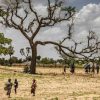
AMSTERDAM, the Netherlands, Nov 10 (IPS) – With the UN climate change conference – COP26 – continuing this week in Glasgow, it’s obvious that there is consensus among a majority of world leaders and key stakeholders that much more needs to be done, if the ambition of keeping global warming to a 1.5-degree increase is to have any chance of being met. Yet talk, as they say, is cheap. Or, in the words of Greta: too much “blah, blah, blah” and not enough action.
-
Magical Thinking on Fertilizer and Climate Change
– Inter Press Service

CAMBRIDGE, Nov 09 (IPS) – As world leaders wrap up the UN Climate Summit in Glasgow, new scientific research shows that there is still a great deal of magical thinking about the contribution of fertilizer to global warming.
-
An Ambitious, Stakeholder-Driven Climate Change Commitment Ahead of COP26: Eswatini’s Revised Nationally Determined Contribution (NDC) Process
– Inter Press Service
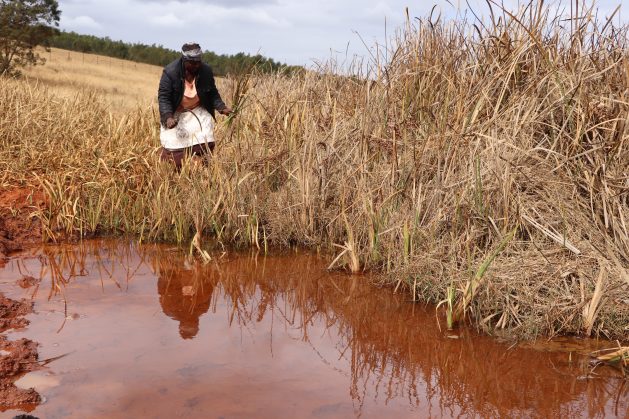
Eswatini, Oct 22 (IPS) – There is no country today that has not experienced the effects of climate change, from changing weather patterns to extreme, devastating weather events.
-
Madagascar: Severe drought could spur world’s first climate change famine
– UN News

More than one million people in southern Madagascar are struggling to get enough to eat, due to what could become the first famine caused by climate change, according to the World Food Programme (WFP).
-
Climate Change: How 1.3 Billion Africans Cause Least But Suffer Most
– Inter Press Service

MADRID, Oct 20 (IPS) – While Africa reportedly causes just 4 percent of global emissions of Carbon Dioxide (CO2) —an acidic colourless gas with a density about 53% higher than that of dry air, causing climate change—, this vast continent, home to over 1.300 billion inhabitants in 52 countries, bears the heaviest brunt of 80 percent of the climate crisis destructive impacts.
-
Fossil fuel production ‘dangerously out of sync’ with climate change targets
– UN News

Despite increased climate ambition and net-zero commitments, governments still plan to produce more than double the amount of energy from fossil fuels in 2030, than the amount that would limit global warming to the Paris Agreement level of 1.5°C.
-
UN-backed report reveals rising climate change risk across Africa
– UN News

Climate change contributed to mounting food insecurity, poverty and displacement in Africa last year, the World Meteorological Organization (WMO) and partners said in a report published on Tuesday.
-
World Food Day: Climate Change is Exacerbating Hunger & Conflict—it’s Time to Break the Cycle
– Inter Press Service

STOCKHOLM, Oct 13 (IPS) – Hunger, violent conflict and the visible impacts of climate change are all on the rise. World Food Day, October 16, is a reminder that we need to talk about the intricate ways that these challenges are connected—and how to tackle them together.
-
Mangrove Blue Carbon for Climate Change Mitigation
– Inter Press Service

NAIROBI, Oct 07 (IPS) – Smelly, boggy, and full of bugs, mangroves’ superpowers are well hidden. However, there is rising confidence that mangroves are the silver bullet to combat the effects of climate change.
-
Extreme Weather the New Normal if Global Warming Increases at Current Speed
– Inter Press Service
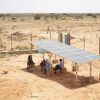
UNITED NATIONS, Sep 28 (IPS) – Rondrotiana Barimalala is a climate researcher at the University of Cape Town in South Africa and a lead author for the IPCC report to the recently released Intergovernmental Panel on Climate Change (IPCC) report titled Climate Change 2021: The Physical Science Basis.
-
Pacific nations appeal for solidarity to combat COVID-19 and climate change
– UN News

Pacific Island leaders speaking in the UN General Assembly on Saturday underlined the need for global solidarity, commitment and action to tackle COVID-19 and climate change, two crises which threaten sustainable development.
-
In a Watershed Year for Climate Change, the Commonwealth Secretary-General calls for Urgent, Decisive and Sustained Climate Action
– Inter Press Service
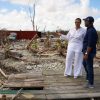
London, Sep 08 (IPS) – This November, five years after signing the Paris Agreement and pledging to limit global warming to 2 degrees Celsius above pre-industrial levels, with a further target of below 1.5 degrees Celsius, world leaders will meet in Glasgow, UK amid COVID-19 pandemic shocks, rising hunger and an Intergovernmental Panel on Climate Change report that warns of more extreme temperature, droughts, forest fires and ice sheet loss due to human activity.
-
Drop coal or climate change will ‘wreak havoc’ across Australian economy
– UN News

Climate change will “wreak havoc” across the Australian economy if coal is not rapidly phased out, a senior UN official warned on Monday.
-
Digital Tech can Help African Island States Cope with Climate Change
– Inter Press Service

BULAWAYO, Zimbabwe, Aug 27 (IPS) – Investing in digital technologies can help African small island developing states (SIDS), vulnerable to extreme weather events, cope with growing impacts of climate change, says the United Nations (UN) Economic Commission for Africa (ECA).
-
A Transformational Approach to Climate Change
– Inter Press Service

NEW YORK, Aug 10 (IPS) – The International Panel on Climate Change (IPCC) issued its starkest report yetexpressing a clear consensus on the rapid changes to global temperatures.
-
A Code Red Warning on the Hazards of Climate Change & an Impending Global Disaster
– Inter Press Service

UNITED NATIONS, Aug 09 (IPS) – A landmark report on the hazards of climate change predicts a devastating future for the world at large.
Authored by the Intergovernmental Panel on Climate Change (IPCC) and released August 9, the study is being described by UN Secretary-General Antonio Guterres as “code red for humanity”— a rallying cry before an impending global disaster.
-
Global warming ‘unequivocally’ human driven, at unprecedented rate: IPCC
– UN News

Climate change is widespread, rapid, and intensifying, and some trends are now irreversible, at least during the present time frame, according to the latest much-anticipated Intergovernmental Panel on Climate Change (IPCC) report, released on Monday.
-
At the UN, Climate Change & Security Must Be Tackled Together
– Inter Press Service
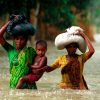
NEW YORK, Jul 13 (IPS) – Could the next wars be triggered by climate change?
Until recently, the question might have seemed like science fiction, but now it is very real. Ethiopia and Egypt are locked in an upward spiral of tensions over the Nile, as a combination of dams and shifting weather patterns pose existential risks to both countries.
-
Conflict, climate change, COVID, forces more people into hunger
– UN News

Global hunger levels have skyrocketed because of conflict, climate change and the economic impact of COVID-19; and one in five children around the world is stunted, UN agencies warned on Monday.
-
Climate Change: Your Choices Matter
– Inter Press Service

TORONTO, Canada, Jun 29 (IPS) – Life is a series of choices. And choices have consequences. When it comes to climate change, some choices have bigger consequences than others, and there’s a startling takeaway: your next “big” decision will play a meaningful role in our collective ability to reach Net-Zero by 2050.
-
Why Pacific Island Nations, like the Federated States of Micronesia, need Climate Change Finance for Food Security Now
– Inter Press Service

SYDNEY, Australia, Jun 28 (IPS) – Robby Nena is one of the many farmers and fishermen on the frontline of climate change in the Federated States of Micronesia (FSM), where coastal flooding and erosion, variable and heavy rainfall, increased temperature, droughts and other extreme weather events are becoming all too common.
-
On climate change frontline, indigenous provide pointers to save planet
– UN News

Indigenous people living on the frontline of climate change could offer potentially ground-breaking insight into biodiversity protection and sustainability, but they urgently need help to withstand a growing number of threats to their way of life, the Food and Agricultural Organization (FAO) said on Friday.
-
Central Sahel: Ground Zero in Tackling Climate Change Through Education
– Inter Press Service

NEW YORK, Jun 16 (IPS) – The climate crisis is amplifying the effects of instability and violence in the world’s poorest countries. Nowhere is this more visible than in Africa’s Central Sahel region, where increasing temperature, floods, droughts and other climate change-induced disasters are triggering conflicts, displacement, and pushing girls and boys into the shadows.
-
UN Scientists: Climate Change and Biodiversity Loss. Two Parts. One Problem.
– Inter Press Service

UNITED NATIONS, Jun 11 (IPS) – Earth is in the throes of multiple environmental crises, with climate change and the loss of biodiversity the most pressing.
The urgency to confront the two challenges has been marked by policies that tackle the issues separately.
Now, a report by a team of scientists has warned that success on either front is hinged on a combined approach to the dual crises.
-
From Climate Change to Covid, Are We Ready to Deal with Disasters?
– Inter Press Service

PARIS, Jun 10 (IPS) – In the last 20 years, disasters affected over 4 billion people. At global level we witness on average one sweeping disaster a day, the majority of which are floods and storms. From the Covid-19 pandemic to climate change, calamities are taking new shapes and sizes, infiltrating every dimension of society. From the emotional to the political, how do we deal with disasters? How can we create a whole-of-society approach to disaster risk reduction?
Author and Page Information
- Created: